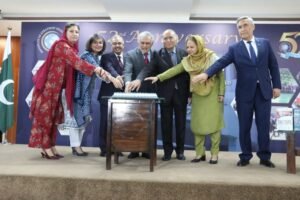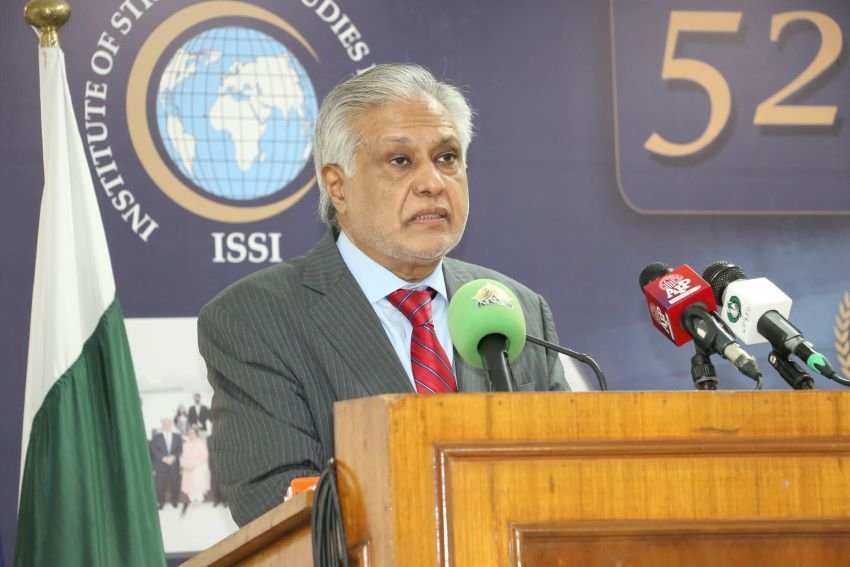Islamabad (TDI): Deputy Prime Minister and Foreign Minister Ishaq Dar on Monday reaffirmed that Pakistan’s foreign policy is now rooted in geo-economics, with an emphasis on regional cooperation, economic integration, and peace.
Speaking at a ceremony marking the 52nd anniversary of the Institute of Strategic Studies Islamabad (ISSI), Dar highlighted the need to rethink regional cooperation across South Asia and called for greater connectivity and mutual development.
“Our foreign policy is now geared towards securing Pakistan’s economic future,” Dar said. “Promoting trade, attracting investment, encouraging remittance flows, and forming strategic development partnerships are top priorities for the foreign ministry.”
In recent months, Pakistan has signaled a renewed diplomatic outreach to its neighbors. Dar cited the launch of a trilateral cooperation mechanism between Pakistan, China, and Bangladesh on June 19 as a significant step toward regional collaboration. “Such mechanisms,” he said, “should be replicated with other South Asian nations, based on mutual benefit and shared interests.”
Read More: Pakistan Pursues Independent Foreign Policy: Dar
Pakistan has also intensified efforts to mend ties with Afghanistan. Dar noted that Islamabad’s engagement with Kabul, including an April visit and a trilateral meeting in Beijing involving China, had opened a new chapter in relations. “We are resetting the relationship with Afghanistan on a positive trajectory,” he said, adding that Pakistan has agreed to extend the China-Pakistan Economic Corridor (CPEC) into Afghan territory.
Dar made it clear that Pakistan expects reciprocal actions from Kabul, stating, “We sincerely hope the Afghan interim government ensures its soil is not used for cross-border terrorism, especially against Pakistan.”

He also spoke at length about Pakistan’s broader diplomatic landscape. Ties with China remain “stronger than ever” under the all-weather strategic partnership, while relations with the United States are expanding in “scope and substance.” Pakistan is also deepening its partnerships with Russia, the European Union, Japan, ASEAN, Saudi Arabia, UAE, and Türkiye, he added.
Dar described the current era as one of global transition and urged that Pakistan must navigate this landscape with a “forward-looking approach,” safeguarding its sovereignty while contributing responsibly to the international order.
Read More: Dar Urges Closer Ties with Japan, UAE
On the issue of India, the foreign minister was forthright. He blamed New Delhi’s “impulsive actions” for undermining regional cooperation and stalling SAARC’s progress. He condemned India’s decision to hold the Indus Waters Treaty in abeyance, calling it a breach of international law. “Pakistan will continue to raise this violation on every global and legal platform,” he pledged.
Referring to a brief but intense conflict with India earlier in May, Dar said Pakistan had responded with a “quid pro quo plus” strategy, which now represents Islamabad’s new defense posture in response to Indian aggression. “India must understand it cannot coerce or intimidate Pakistan,” he said, warning that New Delhi’s “hubristic policies” were a threat to peace in the region.
Dar also reiterated Pakistan’s unwavering support for the people of Kashmir, stating that peace in South Asia was impossible without a fair and lasting resolution of the Jammu and Kashmir dispute.
In addition, he condemned US airstrikes on Iranian nuclear sites during the recent Israel-Iran conflict, calling them a “violation of international law and the UN Charter.” He also denounced Israel’s actions in Gaza, describing them as “a stain on the conscience of humanity” and reaffirmed Pakistan’s demand for international recognition of a Palestinian state.

Sohail Majeed
Sohail Majeed is a Special Correspondent at The Diplomatic Insight. He has twelve plus years of experience in journalism & reporting. He covers International Affairs, Diplomacy, UN, Sports, Climate Change, Economy, Technology, and Health.



